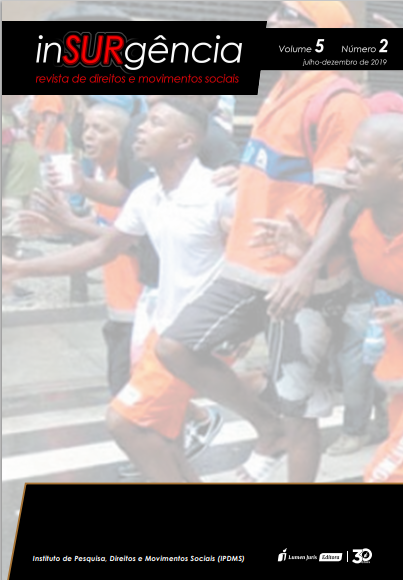CRISE DO DIREITO DO TRABALHO NA ERA PÓS-SOCIALISTA
UMA ANÁLISE ATRAVÉS DA TEORIA DA JUSTIÇA DE NANCY FRASER.
DOI:
https://doi.org/10.26512/insurgencia.v5i2.28861Keywords:
Direito do Trabalho. Nancy Fraser. Teoria da Justiça. Reconhecimento. Redistribuição. Representação.Abstract
This paper aims to provide an overview of the main concepts of Nancy Fraser's multidimensional theory of justice. As an introduction, we briefly present the scenery of “abnormal justice” that has taken place since the decline of the Westphalian national state model and the distributivist tradition of social justice, given the geopolitical transformations brought by the intensification of globalization processes, along with Frasean’s key concepts of justice as participatory parity and analytical multidimensionality. Then, the substantial issues of justice are addressed through its economic and cultural dimensions, explaining the theoretical construction of recognition as a status model. Subsequently, we explain the political dimension of justice both at the substantial and meta-justice levels along with Fraser’s theoretical-political propositions to promote democracy in the globalized world. Lastly, injustices of redistribution, recognition and representation brought by the ascention of neoliberalism as the hegemonic political orientation of national states and productive restructuring are discussed through Fraser’s theoretic framework.
References
LEBARON, Genevieve; HOWARD, Neil, THIBOS, Cameron; KYRITSIS, Penelope. Confronting Root Causes: Forced Labour in Global Supply Chains. Sheffield: SPERI, 2017.
FRASER, Nancy. Heterossexism, Misrecognition and Capitalism: A response to Judith Butler. Fraser, N. (1997). Heterosexism, Misrecognition, and Capitalism: A Response to Judith Butler. Social Text, (52/53), 279.
______. Redistribuição ou reconhecimento? Classe e status na sociedade contemporânea. Interseções ”“ Revista de Estudos Interdisciplinares, UERJ, Rio de Janeiro, Ano 4, nº 1, jan/jun. 2000. p. 7-32. Disponível em: https://edisciplinas.usp.br/ pluginfile.php/4143831/mod_resource/content/1/Fraser.pdf
______. Rethinking recognition. New Left Review, Londres, v. 3, 2000-b. Disponível em: https://newleftreview.org/issues/II3/articles/nancy-fraser-rethinking-recognition.
______. Mapeando a imaginação feminista: da redistribuição ao reconhecimento e à representação. Estudos Feministas, Florianópolis, 15(2): 240, maio-agosto/2007-a. Disponível em: http://www.scielo.br/pdf/ref/v15n2/a02v15n2
______. Reconhecimento sem ética? Lua Nova, São Paulo, 70: 101-138, 2007-b. Disponível em: http://www.scielo.br/pdf/ln/n70/a06n70.pdf
______. Reenquadrando a justiça em um mundo globalizado. Lua Nova, São Paulo, 77: 11-39, 2009-a. Disponível em: http://www.scielo.br/pdf/ln/n77/a01n77.pdf
______. Scales of justice ”“ Remaining Political Space in a Globalizing World. Columbia University Press, Nova Iorque: 2009-b.
MOURA, Julia Sichieri. Charting shifts and moving forward in abnormal times: An interview with Nancy Fraser. ethic@ - An international Journal for Moral Philosophy, Florianópolis, v. 15, n. 1, p. 1- 13, set. 2016. Disponível em: https://periodicos.ufsc.br/ index.php/ethic/article/view/1677-2954.2016v15n1p1
FUDGE, Judy; MUNDLAK, Guy. Justice in a Globalizing World: Resolving Conflicts Involving Workers Rights beyond the Nation State. EUI Working Papers LAW No. 2013/06. Disponível em: <https://ssrn.com/abstract=2293969>
RONZONI, Miriam. Global labour injustice: A critical overview. In Y. Dahan, H. Lerner, & F. Milman-Sivan (Eds.), Global Justice and International Labour Rights (pp. 27-52). Cambridge: Cambridge University Press, 2016. DOI:10.1017/CBO9781316104354.002
VON BROEMBSEN, Marlese. A new ‘constituting narrative’ for labour law: a critique of development and making a case for Fraser’s conception of social justice. Barcelona: Universitat Pompeu Fabra, 2013. Disponível em: <https://www.upf.edu/documents/3298481/3410076/2013-LRNConf_VonBroembsen.pdf/90e2f7f9-7a00-4caf-8cf7-0082345e2dc6>
















